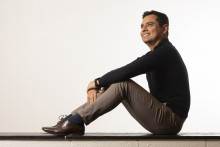You work as Top Management Coach & Analyst. What does that entail?
Scheidt: ‘I provide coaching to international executives, such as board members and other top managers all over Europe. In my previous life, I was a sports scientist, which I still consider the best way to learn how to manage development of people. In sports, you really have to work closely with people – you have to analyze their behavior, their preconditions, personality, performance and targets. I was treating drivers from international motorsport all the way up to world championships. Over time, I was asked to work with more and more business leaders until I eventually got to coaching of top managers.’
Why did you decide to do a doctoral research focused on personal branding of top managers?
‘I’m a big fan of life-long learning and I believe you should take responsibility for your own development. About six or seven years ago, I asked my coachees: did you ever consider yourself to be a personal brand? Interestingly, 95% of them said no, not intentionally. That was striking, because even at that time top managers were very visible on social media and they used that visibility, but apparently not in a very conscious way. While in practice, there is a huge need to apply personal branding to top managers in order to position them and set them apart, because it is a limited market after all. That is why I thought I should gain a better understanding of personal branding, which is why I started a PhD. I wanted a deep dive into the topic. I wanted to develop my own theories and models and use them in practice with my coachees. I wanted to bridge theory and practice.’
How does personal branding of managers differ from, for example, branding of celebrities?
‘Celebrities are built – primarily by media. And some top managers can be celebrities. Look at Elon Musk or Jeff Bezos, for example. My research has focused on “ordinary” top managers. I looked into how their personal brand emerges. In order to have a successful personal branding as a manager, you need to manage your own positioning. You have to stand out among your competitors, but at the same time you need to fit in – fit in with your company, your colleagues, the industry. You need to manage your visibility, both online and offline. Your online and offline presence needs to be consistent. Sometimes people built up an online image, but their real personality is completely different – which detracts their personal brand if you meet them in person.’

What are the key components of a good personal branding?
‘Building a personal brand is something I’ve applied a lot in my practice. The development depends on the individual and the career level, but it includes a few general steps. Firstly, the manager needs to know what he or she brings to the table as a personality. We need to analyze them, see what their values, motives and drivers are. The individual needs to be aware of this, because you can’t change the core of your personality – and your personality is the core of your branding.
‘Many people mistake social media visibility for personal branding’
Secondly, we need to look at the market in which the manager wants to operate. We assess the sector and the company, look at what is expected of managers in that particular field. For instance, if I have a very conservative manager, they are not well suited for a position in a field that is driven by innovation. We need to match the personality with the right market. Then we can derive a real personal brand: what values and key strengths do you bring in as a manager. We build the brand in terms of the impact the manager should be associated with, always maintaining authenticity. Based on that, we apply the personal brand. One of the channels for that is social media. Many people mistake social media visibility for personal branding, but that is only one small part of it.’
You have already applied this approach in practice for many years. How has the PhD helped you in your work?
‘Thanks to the PhD, I’m able to massively sharpen what I’ve already done. Many things became much clearer. For example, many people assume that personal branding is about standing out. I now know that it is also a lot about fitting in – you need the balance to be successful.’
What would be your main piece of advice to managers, based on your doctoral research?
‘Look for a trustful and experienced coach who supports your reflexivity and resilience. You need the outside feedback in order to build a successful personal brand. Personal branding is a lot more complex than it appears to be. You need to go through all the steps of development continuously, because personality can evolve and the environment can change. You cannot just develop personal branding once and then apply it indefinitely. Personal branding is a journey, not a destination.’







